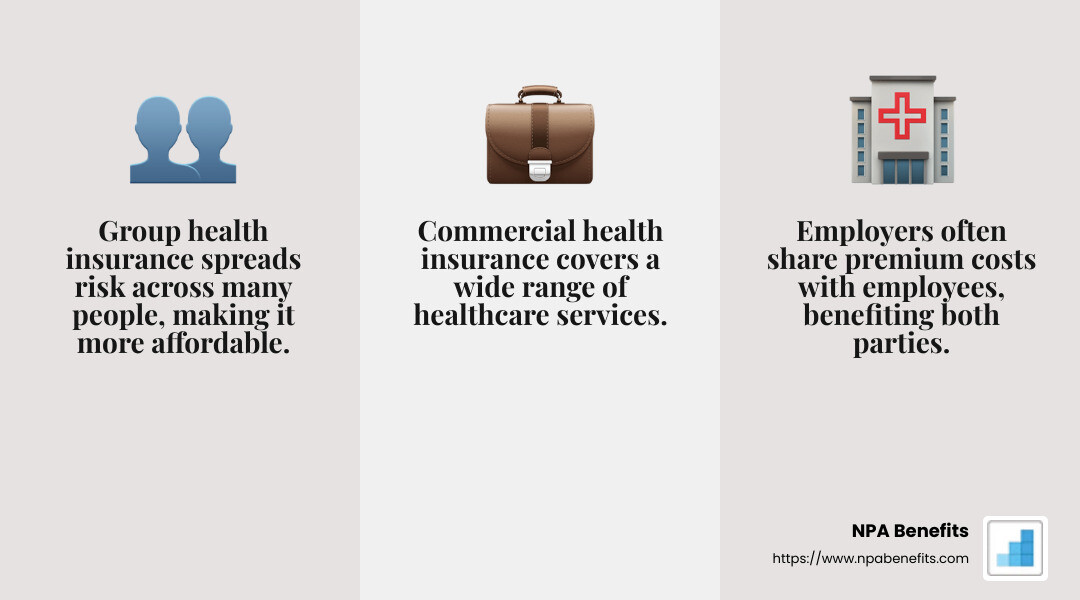How a Business Health Insurance Plan Can Benefit Your Small Business
Finding the right business health insurance plan is crucial for small business owners who want to keep their employees happy and healthy. In today’s competitive job market, offering health insurance can help attract top talent and retain your best employees. Here’s what you need to know:
- Coverage Options: Choose from a variety of plans like HMO, PPO, EPO, and more.
- Employee Benefits: Improve retention, satisfaction, and productivity.
- Cost Management: Tax credits for businesses with fewer than 25 full-time employees can reduce expenses.
In the modern workforce, the well-being of your team is essential to the success of your business. A well-chosen health insurance plan not only safeguards your employees against unexpected medical costs but also strengthens your role as a supportive employer.
As Les Perlson, an experienced partner in the insurance industry with over 40 years in the field, I’ve worked extensively with small to medium-sized businesses to steer the complexities of finding the right business health insurance plan. This guide will deepen your understanding and assist you in making informed decisions.

Understanding Business Health Insurance Plans
When it comes to business health insurance plans, there are several key concepts to grasp. Let’s break them down:
Group Health Insurance
Group health insurance is a policy offered to a group of people, like employees in a company. It’s usually more affordable than individual plans because the risk is spread across many people. Employers often share the cost of premiums with employees, making it a popular choice for businesses.

Commercial Health Insurance
Commercial health insurance is provided by private companies, not the government. It covers a wide range of healthcare services and is the main source of coverage in the U.S. Most commercial insurance is offered as group coverage through employers, which means companies can negotiate better rates and terms for their employees.
Employer-Sponsored Plans
Employer-sponsored plans are health insurance policies chosen by employers to offer their staff. These plans can be a significant perk, attracting and retaining employees. The cost is typically shared between the employer and the employee, and the plan usually includes options for family members at an additional cost.
- Key Features:
- Cost-Effective: Lower premiums due to shared risk.
- Comprehensive Coverage: Often includes medical, dental, and vision benefits.
- Tax Benefits: Premiums are often tax-deductible for employers.
By understanding these components, businesses can make informed choices about their health insurance options, ensuring they provide valuable benefits to their employees while managing costs effectively.
Next, we’ll dig into the different types of business health insurance plans available, such as HMO, PPO, and more.
Types of Business Health Insurance Plans
When choosing a business health insurance plan, it’s crucial to understand the different types available. Each plan type comes with its own set of features, benefits, and costs. Let’s explore the most common ones:
HMO (Health Maintenance Organization)
HMO plans are known for their affordability and focus on preventive care. They require employees to use a network of doctors and hospitals. A primary care physician (PCP) manages all healthcare needs, including referrals to specialists.
- Pros: Lower premiums and out-of-pocket costs.
- Cons: Limited to in-network providers and requires referrals.
- Example: A small tech company might choose an HMO to keep costs low while ensuring employees get necessary preventive care.
PPO (Preferred Provider Organization)
PPO plans offer more flexibility in choosing healthcare providers. Employees don’t need referrals to see specialists and can receive care from out-of-network providers, albeit at a higher cost.
- Pros: Flexibility, no referrals needed, out-of-network care available.
- Cons: Higher premiums and out-of-pocket costs.
- Fact: According to Investopedia, PPOs are popular among businesses that want to offer employees more choices in their healthcare.
EPO (Exclusive Provider Organization)
EPO plans are a middle ground between HMOs and PPOs. They have lower costs but limit coverage to a network of providers. No referrals are needed for specialists.
- Pros: Lower premiums than PPOs, no referrals needed.
- Cons: No out-of-network coverage except in emergencies.
- Example: A retail business might choose an EPO to balance cost savings with some flexibility for employees.
POS (Point of Service)
POS plans require employees to choose a primary care doctor and get referrals for specialists, similar to an HMO. However, they also cover out-of-network care at a higher cost.
- Pros: Flexibility to go out-of-network, lower in-network costs.
- Cons: Requires referrals, higher costs for out-of-network care.
- Fact: POS plans are less common but can be a good fit for businesses with employees who need specialist care.
HDHP (High Deductible Health Plan)
HDHPs come with lower premiums but higher deductibles. They are often paired with Health Savings Accounts (HSAs) to help employees save for medical expenses tax-free.
- Pros: Lower premiums, HSA compatibility.
- Cons: Higher out-of-pocket costs until the deductible is met.
- Example: A startup might opt for an HDHP to keep premiums low while encouraging employees to save for their healthcare needs through HSAs.
Understanding these plan types can help you select the best business health insurance plan that fits your budget and meets your employees’ needs.
Next, we’ll explore how to choose the right business health insurance plan by considering coverage options, cost, and provider networks.
How to Choose the Right Business Health Insurance Plan
Selecting the right business health insurance plan can feel overwhelming, but breaking it down into key components makes it manageable. Let’s focus on three main areas: coverage options, cost considerations, and provider networks.
Coverage Options
Start by assessing the specific healthcare needs of your employees. Do they require extensive coverage for chronic conditions, or will a basic plan suffice?
- Comprehensive Plans: These typically cover a wide range of services, including preventive care, prescription drugs, specialist visits, and emergency care. They’re great for employees who need more extensive healthcare support.
- Basic Plans: These might focus on essential health benefits and be more budget-friendly, suitable for a younger, healthier workforce.
Tip: Conduct surveys or focus groups to gather input from your employees about their healthcare needs.
Cost Considerations
Balancing cost with coverage is crucial. You want to provide good benefits without breaking the bank.
- Premiums: These are the monthly payments to keep the insurance active. Higher premiums often mean lower out-of-pocket costs for employees.
- Deductibles: This is what employees pay out-of-pocket before the insurance kicks in. Plans with higher deductibles generally have lower premiums.
- Out-of-Pocket Costs: Consider co-pays and co-insurance. These can add up, affecting the overall affordability of the plan for employees.
Did You Know? Employers with fewer than 25 full-time employees who pay average wages of $56,000 or less may be eligible for tax credits under the Affordable Care Act, which can help offset costs.
Provider Networks
The network of doctors and hospitals included in a plan can significantly impact employee satisfaction.
- In-Network Providers: Using doctors and facilities within the network usually means lower costs for both employer and employee.
- Out-of-Network Options: Plans like PPOs allow employees to see out-of-network providers, but this comes at a higher cost.
Example: A company offering an HMO plan might emphasize its strong local provider network to ensure employees have easy access to care.
Choosing the right business health insurance plan involves a mix of understanding what your employees need, what your budget can handle, and what provider options are available. By focusing on these aspects, you can make an informed decision that benefits both your business and your employees.
Next, we’ll look at the benefits of offering business health insurance, such as employee retention and productivity.
Benefits of Offering Business Health Insurance
Offering a business health insurance plan isn’t just a legal requirement for some; it’s a strategic move that can significantly benefit your company.
Employee Retention
One of the biggest advantages of providing health insurance is its impact on employee retention. Employees value health benefits highly, often ranking them just below salary in terms of importance. When you offer a comprehensive health plan, you’re telling your employees, “We care about your well-being.”
- Fact: Companies with robust health benefits often report lower turnover rates. Employees are more likely to stay with a company that provides security for their health needs.
Productivity
Health insurance contributes to a healthier workforce, which directly impacts productivity. When employees have access to preventive care and necessary treatments, they’re less likely to take sick days.
Healthy employees are more focused and efficient, leading to better outcomes for your business.
Tax Credits
For small businesses, offering health insurance can also mean significant tax advantages. Under the Affordable Care Act, businesses with fewer than 25 full-time employees might qualify for tax credits if they meet certain criteria, such as paying average wages of $56,000 or less.
- Tax Benefit: These credits can cover up to 50% of the premiums you pay, making health insurance more affordable for your business.
Offering a business health insurance plan isn’t just about compliance or employee satisfaction. It’s an investment in your company’s future. By providing health benefits, you improve employee loyalty, boost productivity, and take advantage of financial incentives.
Next, we’ll dive into some frequently asked questions about business health insurance plans, including how small businesses can offer health insurance and whether LLCs can write off these costs.
Frequently Asked Questions about Business Health Insurance Plans
Navigating business health insurance plans can be daunting. Here, we tackle some of the most common questions small business owners have.
How Can Small Businesses Offer Health Insurance?
Small businesses have several pathways to offer health insurance to their employees:
-
Group Health Insurance: This is the most common option for small businesses. It allows you to provide insurance coverage to your employees as a group. By pooling together, you can often get better rates than if employees were to purchase insurance individually.
-
SHOP Marketplace: The Small Business Health Options Program (SHOP) is an initiative under the Affordable Care Act designed to help small businesses (with 2-50 employees) find affordable and flexible health plans. These plans can be particularly beneficial if you meet eligibility criteria, such as offering coverage to all full-time employees.
-
Private Insurance: If SHOP plans aren’t available in your area or don’t meet your needs, you can also explore options through private insurers. Working with a licensed broker can help you find a plan that fits your business requirements.
Can LLCs Write Off Health Insurance?
Yes, Limited Liability Companies (LLCs) can often write off health insurance, but the specifics depend on the LLC’s tax structure:
-
Single-Member LLCs: If taxed as a sole proprietorship, health insurance premiums can typically be deducted as a business expense on your personal tax return, though not from self-employment taxes.
-
Multi-Member LLCs: For those taxed as partnerships, premiums can be deducted on individual partners’ tax returns. They are reported as guaranteed payments, reducing their self-employment income.
-
LLCs Taxed as Corporations: Here, the company may deduct the premiums as a business expense, and these are not included in the owners’ taxable income.
Consulting a tax professional is advisable to steer these nuances properly.
Is Business Health Insurance Cheaper Than Individual Plans?
Generally, yes. Business health insurance can be more cost-effective than individual plans due to the risk pool concept:
-
Risk Pool: In group health insurance, the risk is spread across a larger pool of insured individuals, which can lead to lower premiums. This is because the insurance company assumes less risk per person when more people are covered under the same plan.
-
Cost Comparison: While individual plans might seem cheaper at first glance, the benefits and coverage levels in group plans often provide better value, especially when considering potential tax credits and deductions available to businesses.
Understanding these options and differences can empower you to make informed decisions about your company’s health insurance offerings. Next, we’ll explore more about the legal and compliance aspects of providing business health insurance.
Conclusion
Navigating the maze of business health insurance plans can be challenging, but with the right partner, it becomes a straightforward journey. At NPA Benefits, we focus on offering flexible options and cost-saving plans that cater to the unique needs of businesses.
Our self-funded health insurance plans stand out because they offer you control. This means you can tailor the benefits to match your company’s specific requirements. Whether you’re a small business or a growing enterprise, we provide solutions that can adapt as your needs evolve.
Why Choose NPA Benefits?
-
Flexibility: Our plans are designed to adapt. As your business grows, your health insurance can grow with you. This flexibility ensures that you’re never stuck with a plan that doesn’t fit your needs.
-
Cost-Saving Plans: By adopting level-funded health plans, you can enjoy the predictability of fixed monthly payments. Plus, there’s potential for refunds on unclaimed premiums, which can lead to significant savings. This approach not only helps manage budgets but also provides comprehensive coverage that meets the expectations of today’s employees.
-
Control: With NPA Benefits, you have the power to design a plan that aligns with your company’s goals. This control allows you to prioritize the benefits that matter most to your employees, enhancing satisfaction and retention.
Choosing the right health insurance plan for your business is crucial. It impacts employee satisfaction, retention, and your bottom line. With our expertise and innovative solutions, NPA Benefits is here to guide you every step of the way.
Take the next step towards a healthier future for your organization. Find more about how we can assist you by visiting our services page.







